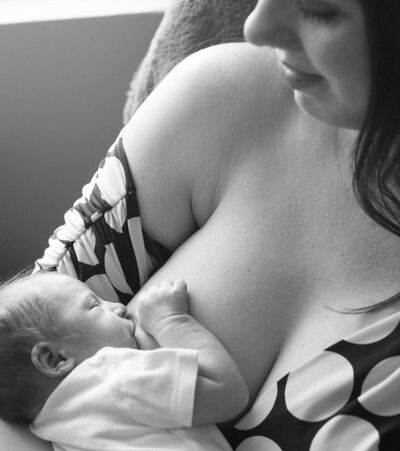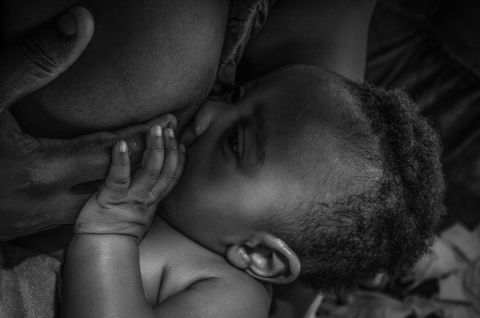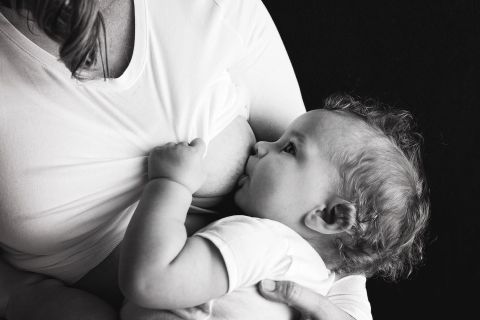|
|
Breastfeeding Your Baby!
Let's first talk about the benefits of breastfeeding your baby!
Breastfeeding is a natural way of bonding with your child. For a breastfeeding baby, their mothers breast is the most important thing in their life! It is not just a source of food but also a source comfort and security! Breast-milk has everything that your baby needs. It contains all the right nutrients in the right amount for infants and toddlers, no indigestion or stomach problems. Breast-milk Protects against disease and infection.
Mothers produce colostrum during the first few weeks before birth and the first few days after birth. Colostrum is a thin fluid that contains antibodies and fights viruses. Breastfed babies are less likely to suffer from gastro-intestinal infections, diarrhea, respiratory and ear infections, due to receiving colostrum in those first few days of their lives.
Nursing and holding your baby close causes the brain to release a hormone-like substance called Oxytocin. This hormone is released with skin contact. It has sometimes been called the "cuddle hormone" or the "bonding hormone". Oxytocin, which regulates milk release, is associated with feelings of love and helps stimulate a mother's nurturing instinct. Prolactin is another hormone released by the mother that is responsible for producing milk and produces calmness, which helps the mother to relax. Babies feel safe and secure at their mothers breast! It can be very soothing to them when they are upset or hurting.
Let's first talk about the benefits of breastfeeding your baby!
Breastfeeding is a natural way of bonding with your child. For a breastfeeding baby, their mothers breast is the most important thing in their life! It is not just a source of food but also a source comfort and security! Breast-milk has everything that your baby needs. It contains all the right nutrients in the right amount for infants and toddlers, no indigestion or stomach problems. Breast-milk Protects against disease and infection.
Mothers produce colostrum during the first few weeks before birth and the first few days after birth. Colostrum is a thin fluid that contains antibodies and fights viruses. Breastfed babies are less likely to suffer from gastro-intestinal infections, diarrhea, respiratory and ear infections, due to receiving colostrum in those first few days of their lives.
Nursing and holding your baby close causes the brain to release a hormone-like substance called Oxytocin. This hormone is released with skin contact. It has sometimes been called the "cuddle hormone" or the "bonding hormone". Oxytocin, which regulates milk release, is associated with feelings of love and helps stimulate a mother's nurturing instinct. Prolactin is another hormone released by the mother that is responsible for producing milk and produces calmness, which helps the mother to relax. Babies feel safe and secure at their mothers breast! It can be very soothing to them when they are upset or hurting.
Reading was one of the things that helped me feel more like I knew what I was doing. This are some of the books that I found helpful:
|
|
|
|
|
|
When breastfeeding, the suckling motion helps develop babies' lungs. The physical effort involved in nursing may leave babies with better lung function well into childhood, as found by research. A nursing baby will get much more skin-to-skin contact with mommy and that can make a difference in how well your baby grows. Studies show that, babies that have plenty of human touch and contact grow much better and are healthier than those that don't have it.
Another great benefit is the great money savings you will have by nursing your baby.You can save thousands of dollars by not having to buy formula.
Breastfeeding is also helpful to the mother in shedding those extra baby pounds. Breastfeeding can burn up to 500 calories a day! Studies also show that mothers who breastfeed are less likely to suffer from breast cancer, ovarian cancer and urinary tract infection.
So as you can see there are many benefits for you and your baby and this isn't even all of the benefits. Many women worry about the size of their breast but no matter the size of your breast most anyone can nurse their baby!
|
|
|
So once you make the decision to breastfeed your baby. There is much to learn about. Breastfeeding isn't always as simple as mothers assume it will be, so it is a good idea to learn as much as you can about it while you are pregnant. Talk to other friends or ladies that you know that have breastfed their babies, they can give you some good advice and useful tips. You can also join a "Le Leche League" group and learn a lot and get a lot of support.
HOW TO POSITION YOUR BABY:
Here are three of the most common positions and most natural for many women:
Cradle hold - Mom sits supported by pillows at her lower back and arms, elevates the baby on a pillow to relieve any strain on her arms, the baby’s body forms a "C" shape with his feet curled around Mom’s body (tummy to tummy), she cradles baby’s head in the crook of her arm, tucks the baby’s lower arm around her body (under her elbow),
centers the baby’s wide open mouth over the nipple/areola and begins feeding.
Football hold - Sit holding your baby with it's legs going behind you along your side, cradled against your body and it's head cradled in your hand at your breast.
This position can be especially helpful to mothers that have had c-sections and can't stand any pressure on the stomach.
Side lying - Many mothers use this position when they are in bed. The mother just lays on her side with the arm against the bed raised above her head and lay your baby on its side on the bed tummy to tummy with you. With its mouth at your breast while supporting the baby with her other arm.
I mostly nursed my babies in the cradle hold, that was most natural and comfortable to me. Everyone is different though and there is no right or wrong when it comes to breastfeeding positions. I have seen some very unique positions used, some that brought a smile to my face for sure. So just go with what feel right to you.
For those that use the cradle hold position having a nursing pillow can be helpful for your posture. Here is one that I like:
Latching on:
The first step to a proper latch on is getting baby to open WIDE! Brush baby's lips with your nipple to encourage him to open wide, as if yawning. Once baby's mouth is open wide, quickly pull him/her onto the breast by pulling the baby toward you with the arm that is holding him/her. Make sure you move the baby towards you, and not move yourself towards the baby. As this causes bad posture and can give you a backache. The baby's gums should completely bypass the nipple and cover approximately one inch of the areola behind the nipple. Make sure the baby's lips are everted (turned out). Some baby's will tighten or purse their lips, especially the lower one. If the lower lip is inverted (turned in), try simply pressing down on baby's chin to turn the lip back out the correct way. To make sure your baby is correctly latched on. Look to see if the baby's lips are correctly turned out and the mouth is open wide. Also notice how much of the breast is in baby's mouth, a large part of the areola should be inside. If your baby is latched on and sucking correctly, you should not feel any pain. If you feel pain or the baby does not seem to be sucking correctly, stop and start over again. Break the suction by putting your finger on the side of the baby's mouth between the baby's lips and your breast.
DO NOT let the baby continue to feed incorrectly! It can cause you to develop painful or sore nipples, also the baby may not be able to get enough milk. When I did get sore nipples I would apply pure lanolin after each feeding and it really helped. Also it is completely natural so you don't have to wash it off before you nurse again. Below is the kind I used.
|
|
|
To those of you who are breastfeeding your baby, I hope that this page has been helpful and encouraging. To those who are not, I hope that you have learned something that you can use to help someone else!
To those of you who are breastfeeding your baby, I hope that this page has been helpful and encouraging. To those who are not, I hope that you have learned something that you can use to help someone else!
DISCLAIMER : Nothing on this site is meant in any way to be medical advice! Any questions or problems you may have, should be discussed with your caregiver! Thanks!
|
|




